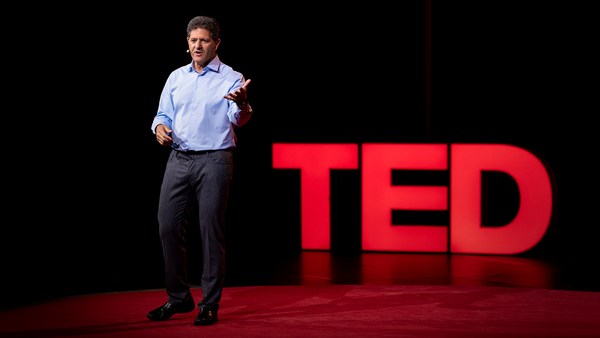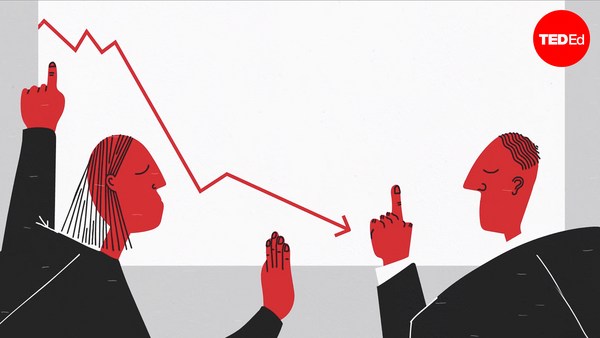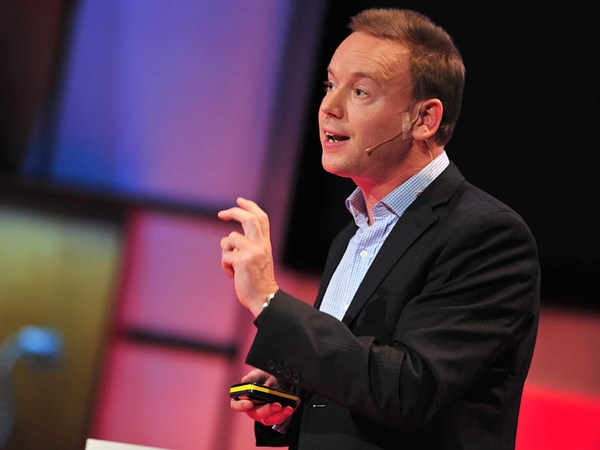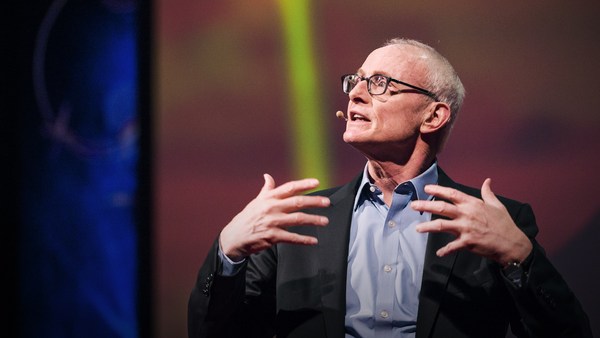Value creation. Wealth creation. These are really powerful words. Maybe you think of finance, you think of innovation, you think of creativity. But who are the value creators? If we use that word, we must be implying that some people aren't creating value. Who are they? The couch potatoes? The value extractors? The value destroyers? To answer this question, we actually have to have a proper theory of value. And I'm here as an economist to break it to you that we've kind of lost our way on this question.
Now, don't look so surprised. What I mean by that is, we've stopped contesting it. We've stopped actually asking really tough questions about what is the difference between value creation and value extraction, productive and unproductive activities.
Now, let me just give you some context here. 2009 was just about a year and a half after one of the biggest financial crises of our time, second only to the 1929 Great Depression, and the CEO of Goldman Sachs said Goldman Sachs workers are the most productive in the world. Productivity and productiveness, for an economist, actually has a lot to do with value. You're producing stuff, you're producing it dynamically and efficiently. You're also producing things that the world needs, wants and buys. Now, how this could have been said just one year after the crisis, which actually had this bank as well as many other banks -- I'm just kind of picking on Goldman Sachs here -- at the center of the crisis, because they had actually produced some pretty problematic financial products mainly but not only related to mortgages, which saw many thousands of people actually lose their homes. In 2010, in just one month, September, 120,000 people lost their homes through the foreclosures of that crisis. Between 2007 and 2010, 8.8 million people lost their jobs. The bank also had to then be bailed out by the US taxpayer for the sum of 10 billion dollars. We didn't hear the taxpayers bragging that they were value creators, but obviously, having bailed out one of the biggest value-creating productive companies, perhaps they should have.
What I want to do next is kind of ask ourselves how we lost our way, how it could be, actually, that a statement like that could almost go unnoticed, because it wasn't an after-dinner joke; it was said very seriously.
So what I want to do is bring you back 300 years in economic thinking, when, actually, the term was contested. It doesn't mean that they were right or wrong, but you couldn't just call yourself a value creator, a wealth creator. There was a lot of debate within the economics profession. And what I want to argue is, we've kind of lost our way, and that has actually allowed this term, "wealth creation" and "value," to become quite weak and lazy and also easily captured.
OK? So let's start -- I hate to break it to you -- 300 years ago. Now, what was interesting 300 years ago is the society was still an agricultural type of society. So it's not surprising that the economists of the time, who were called the Physiocrats, actually put the center of their attention to farm labor. When they said, "Where does value come from?" they looked at farming. And they produced what I think was probably the world's first spreadsheet, called the "Tableau Economique," and this was done by François Quesnay, one of the leaders of this movement. And it was very interesting, because they didn't just say, "Farming is the source of value."
They then really worried about what was happening to that value when it was produced. What the Tableau Economique does -- and I've tried to make it a bit simpler here for you -- is it broke down the classes in society into three. The farmers, creating value, were called the "productive class." Then others who were just moving some of this value around but it was useful, it was necessary, these were the merchants; they were called the "proprietors." And then there was another class that was simply charging the farmers a fee for an existing asset, the land, and they called them the "sterile class." Now, this is a really heavy-hitting word if you think what it means: that if too much of the resources are going to the landlords, you're actually putting the reproduction potential of the system at risk. And so all these little arrows there were their way of simulating -- again, spreadsheets and simulators, these guys were really using big data -- they were simulating what would actually happen under different scenarios if the wealth actually wasn't reinvested back into production to make that land more productive and was actually being siphoned out in different ways, or even if the proprietors were getting too much.
And what later happened in the 1800s, and this was no longer the Agricultural Revolution but the Industrial Revolution, is that the classical economists, and these were Adam Smith, David Ricardo, Karl Marx, the revolutionary, also asked the question "What is value?" But it's not surprising that because they were actually living through an industrial era with the rise of machines and factories, they said it was industrial labor. So they had a labor theory of value. But again, their focus was reproduction, this real worry of what was happening to the value that was created if it was getting siphoned out.
And in "The Wealth of Nations," Adam Smith had this really great example of the pin factory where he said if you only have one person making every bit of the pin, at most you can make one pin a day. But if you actually invest in factory production and the division of labor, new thinking -- today, we would use the word "organizational innovation" -- then you could increase the productivity and the growth and the wealth of nations. So he showed that 10 specialized workers who had been invested in, in their human capital, could produce 4,800 pins a day, as opposed to just one by an unspecialized worker. And he and his fellow classical economists also broke down activities into productive and unproductive ones.
(Laughter)
And the unproductive ones weren't -- I think you're laughing because most of you are on that list, aren't you?
(Laughter)
Lawyers! I think he was right about the lawyers. Definitely not the professors, the letters of all kind people. So lawyers, professors, shopkeepers, musicians. He obviously hated the opera. He must have seen the worst performance of his life the night before writing this book. There's at least three professions up there that have to do with the opera.
But this wasn't an exercise of saying, "Don't do these things." It was just, "What's going to happen if we actually end up allowing some parts of the economy to get too large without really thinking about how to increase the productivity of the source of the value that they thought was key, which was industrial labor.
And again, don't ask yourself is this right or is this wrong, it was just very contested. By making these lists, it actually forced them also to ask interesting questions. And their focus, as the focus of the Physiocrats, was, in fact, on these objective conditions of production. They also looked, for example, at the class struggle. Their understanding of wages had to do with the objective, if you want, power relationships, the bargaining power of capital and labor. But again, factories, machines, division of labor, agricultural land and what was happening to it.
So the big revolution that then happened -- and this, by the way, is not often taught in economics classes -- the big revolution that happened with the current system of economic thinking that we have, which is called "neoclassical economics," was that the logic completely changed. It changed in two ways. It changed from this focus on objective conditions to subjective ones.
Let me explain what I mean by that. Objective, in the way I just said. Subjective, in the sense that all the attention went to how individuals of different sorts make their decisions. OK, so workers are maximizing their choices of leisure versus work. Consumers are maximizing their so-called utility, which is a proxy for happiness, and firms are maximizing their profits. And the idea behind this was that then we can aggregate this up, and we see what that turns into, which are these nice, fancy supply-and-demand curves which produce a price, an equilibrium price. It's an equilibrium price, because we also added to it a lot of Newtonian physics equations where centers of gravity are very much part of the organizing principle. But the second point here is that that equilibrium price, or prices, reveal value.
So the revolution here is a change from objective to subjective, but also the logic is no longer one of what is value, how is it being determined, what is the reproductive potential of the economy, which then leads to a theory of price but rather the reverse: a theory of price and exchange which reveals value.
Now, this is a huge change. And it's not just an academic exercise, as fascinating as that might be. It affects how we measure growth. It affects how we steer economies to produce more of some activities, less of others, how we also remunerate some activities more than others. And it also just kind of makes you think, you know, are you happy to get out of bed if you're a value creator or not, and how is the price system itself if you aren't determining that?
I mentioned it affects how we think about output. If we only include, for example, in GDP, those activities that have prices, all sorts of really weird things happen. Feminist economists and environmental economists have actually written about this quite a bit. Let me give you some examples. If you marry your babysitter, GDP will go down, so do not do it. Do not be tempted to do this, OK? Because an activity that perhaps was before being paid for is still being done but is no longer paid.
(Laughter)
If you pollute, GDP goes up. Still don't do it, but if you do it, you'll help the economy. Why? Because we have to actually pay someone to clean it.
Now, what's also really interesting is what happened to finance in the financial sector in GDP. This also, by the way, is something I'm always surprised that many economists don't know. Up until 1970, most of the financial sector was not even included in GDP. It was kind of indirectly, perhaps not knowingly, still being seen through the eyes of the Physiocrats as just kind of moving stuff around, not actually producing anything new. So only those activities that had an explicit price were included. For example, if you went to get a mortgage, you were charged a fee. That went into GDP and the national income and product accounting. But, for example, net interest payments didn't, the difference between what banks were earning in interest if they gave you a loan and what they were paying out for a deposit. That wasn't being included.
And so the people doing the accounting started to look at some data, which started to show that the size of finance and these net interest payments were actually growing substantially. And they called this the "banking problem." These were some people working inside, actually, the United Nations in a group called the Systems of National [Accounts], SNA. They called it the "banking problem," like, "Oh my God, this thing is huge, and we're not even including it." So instead of stopping and actually making that Tableau Economique or asking some of these fundamental questions that also the classicals were asking about what is actually happening, the division of labor between different types of activities in the economy, they simply gave these net interest payments a name. So the commercial banks, they called this "financial intermediation." That went into the NIPA accounts. And the investment banks were called the "risk-taking activities," and that went in. In case I haven't explained this properly, that red line is showing how much quicker financial intermediation as a whole was growing compared to the rest of the economy, the blue line, industry.
And so this was quite extraordinary, because what actually happened, and what we know today, and there's different people writing about this, this data here is from the Bank of England, is that lots of what finance was actually doing from the 1970s and '80s on was basically financing itself: finance financing finance. And what I mean by that is finance, insurance and real estate. In fact, in the UK, something like between 10 and 20 percent of finance finds its way into the real economy, into industry, say, into the energy sector, into pharmaceuticals, into the IT sector, but most of it goes back into that acronym, FIRE: finance, insurance and real estate. It's very conveniently called FIRE.
Now, this is interesting because, in fact, it's not to say that finance is good or bad, but the degree to which, by just having to give it a name, because it actually had an income that was being generated, as opposed to pausing and asking, "What is it actually doing?" -- that was a missed opportunity.
Similarly, in the real economy, in industry itself, what was happening? And this real focus on prices and also share prices has created a huge problem of reinvestment, again, this real attention that both the Physiocrats and the classicals had to the degree to which the value that was being generated in the economy was in fact being reinvested back in. And so what we have today is an ultrafinancialized industrial sector where, increasingly, a share of the profits and the net income are not actually going back into production, into human capital training, into research and development but just being siphoned out in terms of buying back your own shares, which boosts stock options, which is, in fact, the way that many executives are getting paid. And, you know, some share buybacks is absolutely fine, but this system is completely out of whack. These numbers that I'm showing you here show that in the last 10 years, 466 of the S and P 500 companies have spent over four trillion on just buying back their shares. And what you see then if you aggregate this up at the macroeconomic level, so if we look at aggregate business investment, which is a percentage of GDP, you also see this falling level of business investment. And this is a problem.
This, by the way, is a huge problem for skills and job creation. You might have heard there's lots of attention these days to, "Are the robots taking our jobs?" Well, mechanization has for centuries, actually, taken jobs, but as long as profits were being reinvested back into production, then it didn't matter: new jobs appeared. But this lack of reinvestment is, in fact, very dangerous.
Similarly, in the pharmaceutical industry, for example, how prices are set, it's quite interesting how it doesn't look at these objective conditions of the collective way in which value is created in the economy. So in the sector where you have lots of different actors -- public, private, of course, but also third-sector organizations -- creating value, the way we actually measure value in this sector is through the price system itself. Prices reveal value. So when, recently, the price of an antibiotic went up by 400 percent overnight, and the CEO was asked, "How can you do this? People actually need that antibiotic. That's unfair." He said, "Well, we have a moral imperative to allow prices to go what the market will bear," completely dismissing the fact that in the US, for example, the National Institutes of Health spent over 30 billion a year on the medical research that actually leads to these drugs. So, again, a lack of attention to those objective conditions and just allowing the price system itself to reveal the value.
Now, this is not just an academic exercise, as interesting as it may be. All this really matters [for] how we measure output, to how we steer the economy, to whether you feel that you're productive, to which sectors we end up helping, supporting and also making people feel proud to be part of. In fact, going back to that quote, it's not surprising that Blankfein could say that. He was right. In the way that we actually measure production, productivity and value in the economy, of course Goldman Sachs workers are the most productive. They are in fact earning the most. The price of their labor is revealing their value. But this becomes tautological, of course.
And so there's a real need to rethink. We need to rethink how we're measuring output, and in fact there's some amazing experiments worldwide. In New Zealand, for example, they now have a gross national happiness indicator. In Bhutan, also, they're thinking about happiness and well-being indicators. But the problem is that we can't just be adding things in. We do have to pause, and I think this should be a moment for pause, given that we see so little has actually changed since the financial crisis, to make sure that we are not also confusing value extraction with value creation, so looking at what's included, not just adding more, to make sure that we're not, for example, confusing rents with profits. Rents for the classicals was about unearned income. Today, rents, when they're talked about in economics, is just an imperfection towards a competitive price that could be competed away if you take away some asymmetries.
Second, we of course can steer activities into what the classicals called the "production boundary." This should not be an us-versus-them, big, bad finance versus good, other sectors. We could reform finance. There was a real lost opportunity in some ways after the crisis. We could have had the financial transaction tax, which would have rewarded long-termism over short-termism, but we didn't decide to do that globally. We can. We can change our minds. We can also set up new types of institutions. There's different types of, for example, public financial institutions worldwide that are actually providing that patient, long-term, committed finance that helps small firms grow, that help infrastructure and innovation happen.
But this shouldn't just be about output. This shouldn't just be about the rate of output. We should also as a society pause and ask: What value are we even creating? And I just want to end with the fact that this week we are celebrating the 50th anniversary of the Moon landing. This required the public sector, the private sector, to invest and innovate in all sorts of ways, not just around aeronautics. It included investment in areas like nutrition and materials. There were lots of actual mistakes that were done along the way. In fact, what government did was it used its full power of procurement, for example, to fuel those bottom-up solutions, of which some failed. But are failures part of value creation? Or are they just mistakes? Or how do we actually also nurture the experimentation, the trial and error and error and error?
Bell Labs, which was the R and D laboratory of AT and T, actually came from an era where government was quite courageous. It actually asked AT and T that in order to maintain its monopoly status, it had to reinvest its profits back into the real economy, innovation and innovation beyond telecoms. That was the history, the early history of Bell Labs. So how we can get these new conditions around reinvestment to collectively invest in new types of value directed at some of the biggest challenges of our time, like climate change? This is a key question.
But we should also ask ourselves, had there been a net present value calculation or a cost-benefit analysis done about whether or not to even try to go to the Moon and back again in a generation, we probably wouldn't have started. So thank God, because I'm an economist, and I can tell you, value is not just price.
Thank you.
(Applause)





